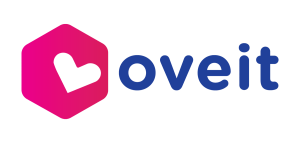Looking for the best event registration software but feeling lost in a sea of options? Event planning just got easier! Dive into this curated list where the spotlight shines on top-notch event registration platforms. Whether you’re a seasoned event organizer or just dipping your toes into the planning pool, this guide offers a treasure trove of insights to help you navigate the diverse landscape of event registration tools. Discover user-friendly features, pricing insights, and unique offerings that make each platform a gem in its own right. It’s your passport to streamlined event management!
Oveit:
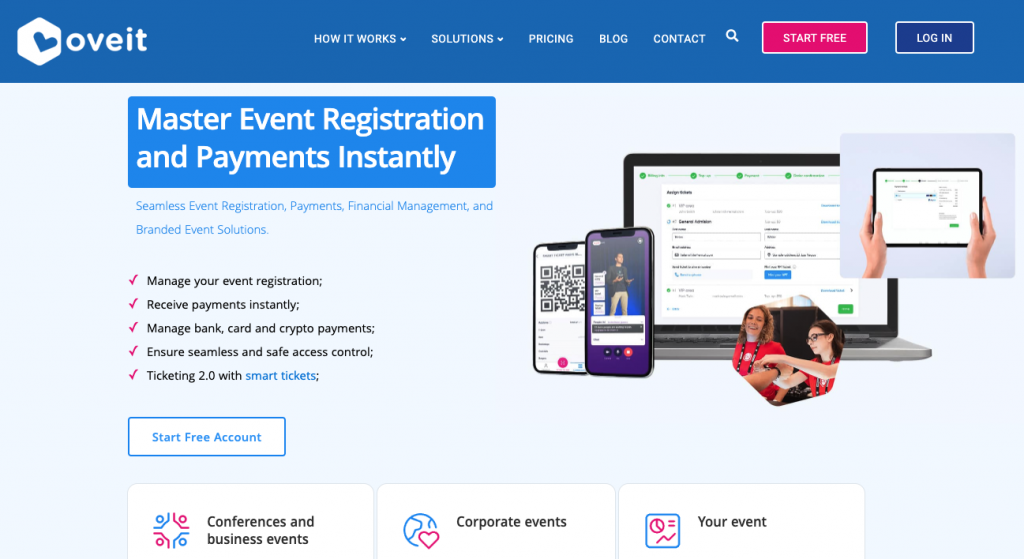
Strengths:
- Direct Payments for Event Registration: Oveit’s emphasis on registration and instant payments is a significant strength, streamlining the registration process for both organizers and attendees. One key element is that Oveit provides registration payments for credit and debit card, ACH/bank transfers and even crypto.
- Flexibility: Positioned as more flexible than other platforms, catering to a diverse range of events, from conferences to corporate events.
- Smart tickets, wearables, video ticketing: Oveit showcases a few features that are not available with any other contender on this list. The highlights are smart tickets (blockchain based tickets that solve ticket fraud), wearable wristbands and badges and video ticketing (an innovative way to sell tickets in live or recorded video).
- Freemium Plan: The availability of a freemium plan, allowing free event registration for up to 300 visitors, is a notable advantage, particularly for growing events. The PRO plans are easily accessible. The Business option offers full support for midsized and large events registration
Weaknesses:
- Market Recognition: Despite its strengths, Oveit is one of the relative new comers in the market (being around since 2016). The market recognition appears to be relatively lower compared to old school companies.
- Limited Features: Oveit focuses on providing a great registration, payments and access control platform. However, if you need event networking or logistics support, other, more expensive (and sometimes bloated) platforms could be the answer.
Cvent:
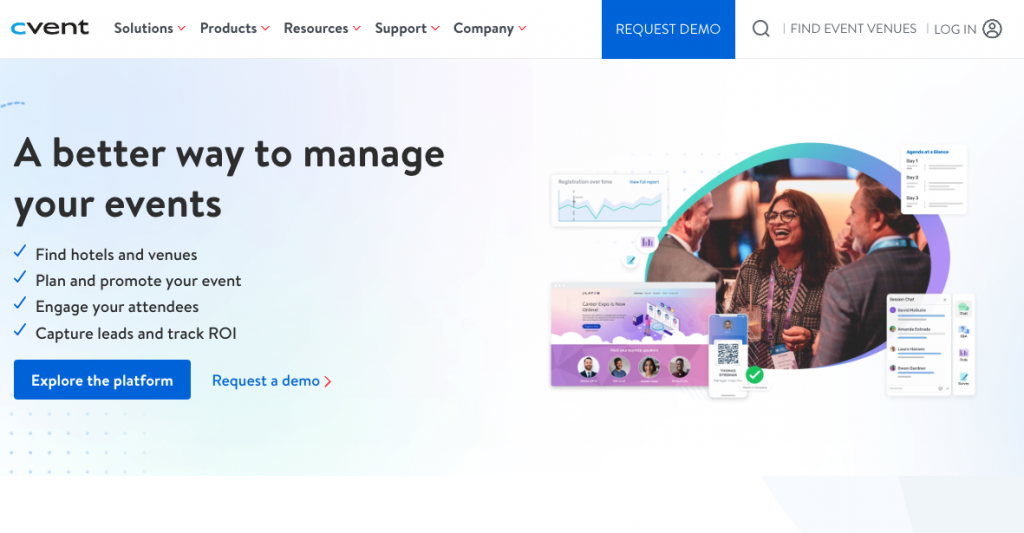
Strengths:
- Comprehensive Platform: Cvent offers an all-in-one solution for event planning and marketing, including registration, venue sourcing, and analytics.
- User Testimonials: Positive feedback from clients like Cornell University and Walmart Inc. adds credibility to their platform.
- Robust Features: Cvent provides various features, including mobile event apps, check-in and badging, webinars, and attendee hubs, making it a versatile choice for event organizers.
- Large User Base: Processing 240M+ registrations and managing 6M+ events indicates a wide user adoption, which often translates to a stable and reliable platform.
Weaknesses:
- Potentially Overwhelming: The platform’s extensive features might be overwhelming for smaller events or users with simpler needs.
- Expensive: The level of features and the large-scale operation may come with a higher price tag, making it less accessible for smaller organizations.
Bizzabo:
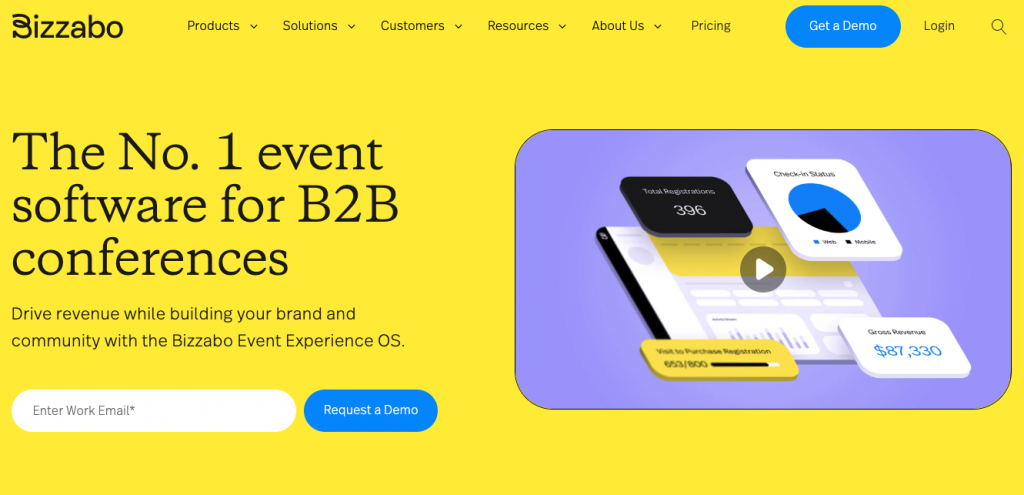
Strengths:
- Holistic Event Experience: Bizzabo aims to provide a comprehensive event experience OS, covering various event types, from conferences to webinars.
- User Reviews: Positive reviews from users like Piano.io and HubSpot on ease of use and growth support contribute to Bizzabo’s credibility.
- Revenue Generation: Bizzabo emphasizes driving revenue through events, connecting them to CRM, and providing lead capture tools, catering to business needs.
Weaknesses:
- Complexity for Smaller Events: The platform’s extensive features might be more than necessary for smaller events, potentially making it a complex solution for simpler needs.
- Pricing Concerns: While not explicitly mentioned, the emphasis on revenue generation and enterprise features might imply a higher cost, which can be a barrier for smaller organizations.
Splash:
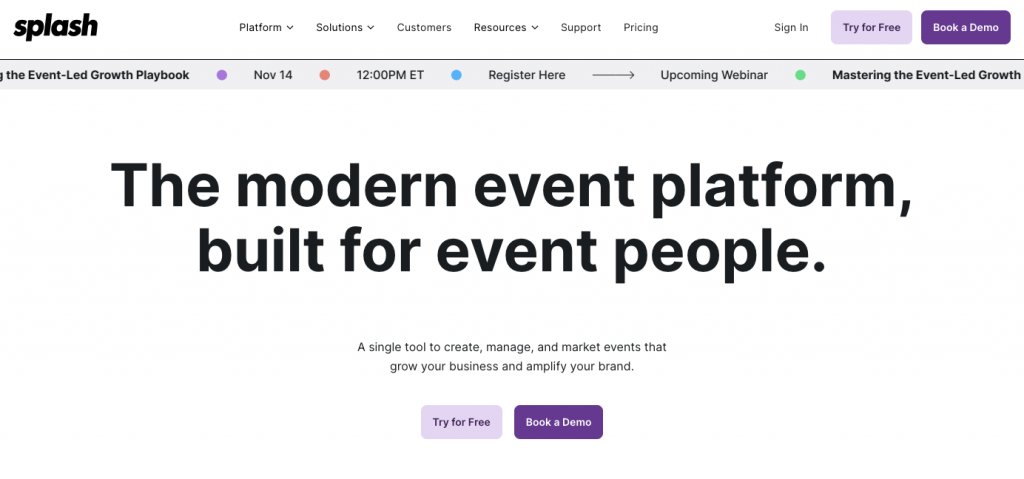
Strengths:
- Comprehensive Event Marketing: Splash’s focus on online, in-person, and hybrid events positions it as a comprehensive event marketing tool.
- Design and Customization: Responsive web page and email customization options enhance the visual appeal of events.
- Integration with HubSpot: Integration with HubSpot facilitates seamless event management and data utilization.
Weaknesses:
- Limited Pricing Information: The absence of clear pricing details in the provided content can be a drawback for organizations evaluating the platform.
Eventbrite:
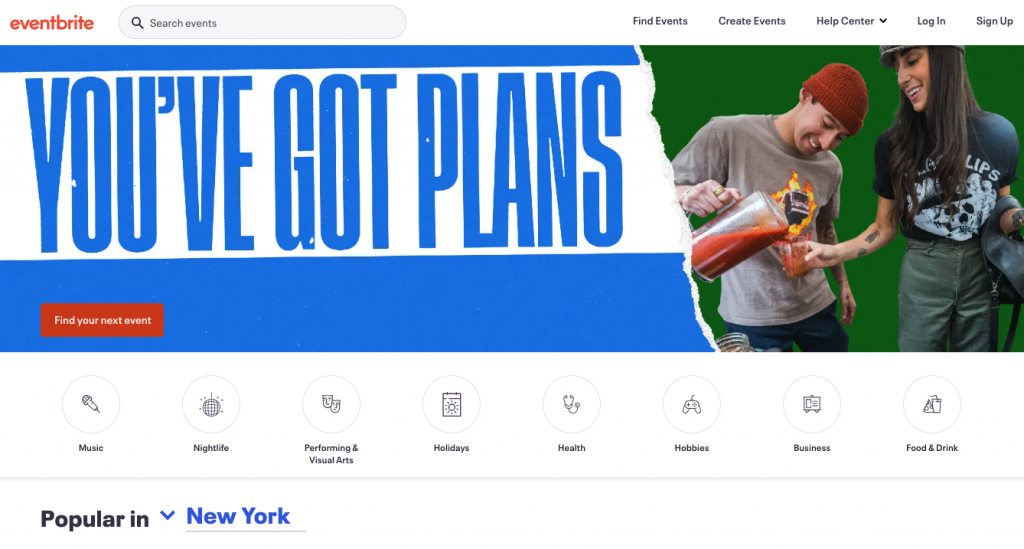
Strengths:
- User-Friendly Registration: Eventbrite’s three-step registration process simplifies event setup for organizers.
- Ticket Customization: The ability to create various ticket types and offer discounts adds flexibility.
- Social Media Integration: Seamless sharing on platforms like Facebook and Instagram enhances event visibility.
- Strong Marketplace: Eventbrite sports one of the most popular ticketing and registrations marketplace with millions of users.
Weaknesses:
- Pricing Complexity: While offering both free and paid plans, the variety of plans and features may be complex for users seeking simplicity.
- Payments Sent after Events: While some exceptions may exist the usual customer will have to wait until the event is done to receive their funds which may prove hard for most event planners.
vFairs:
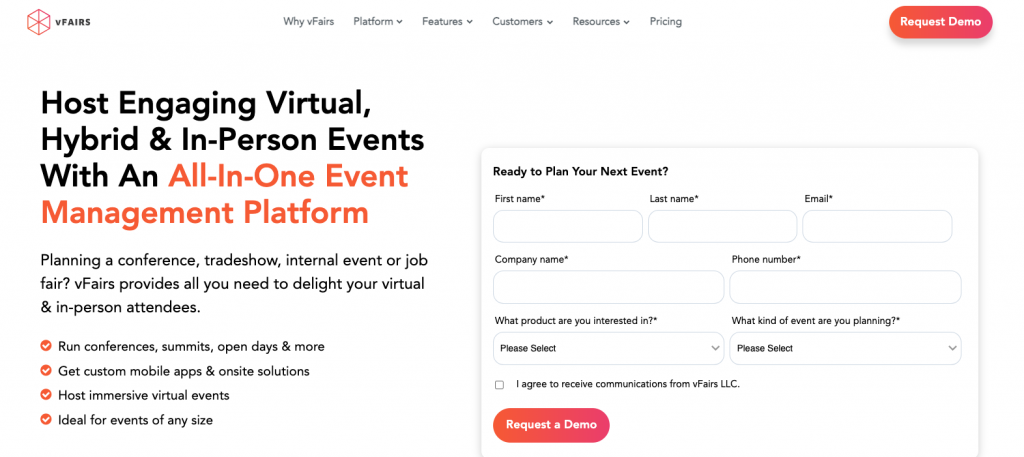
Strengths:
- Virtual, Hybrid, and In-Person: vFairs positions itself as an all-in-one platform for virtual, hybrid, and in-person events, providing flexibility.
- Industry Recognition: Being ranked #1 in the Event Management Platform & Virtual Event Platform categories on G2 adds credibility.
- Customizable Platform: vFairs offers a customizable platform from event registration to analytics, catering to diverse event needs.
Weaknesses:
- Potentially Complex: The inclusion of virtual, hybrid, and in-person capabilities might make the platform complex for users with specific event needs.
- Limited User Testimonials: While G2 rankings add credibility, the absence of user testimonials in the provided content is a notable gap.
SpotMe:
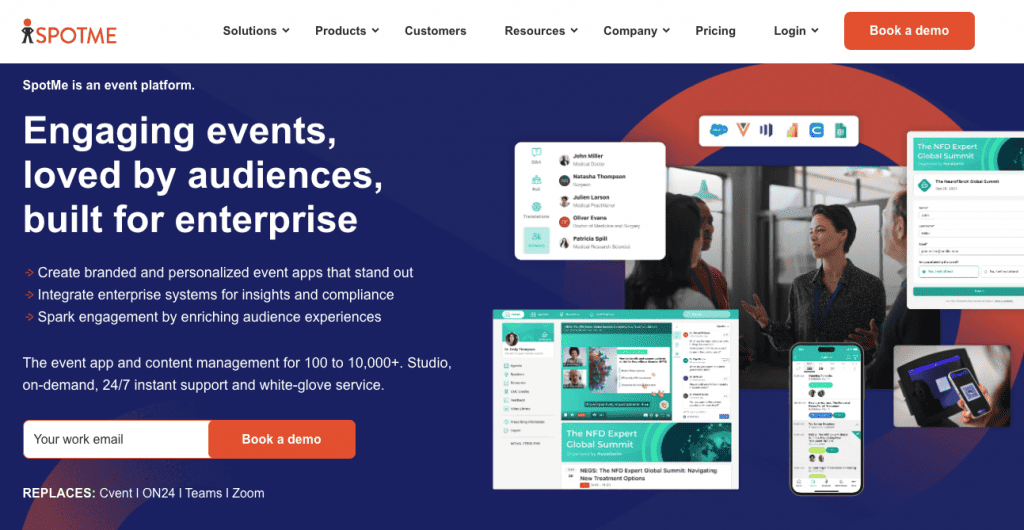
Strengths:
- Enterprise-Grade Platform: SpotMe’s positioning as an enterprise-grade platform makes it suitable for high-touch industries.
- Customized Registration Pages: The flexibility to build customized registration webpages aligns with diverse event setups.
- Real-Time Tracking and Reporting: SpotMe’s emphasis on real-time tracking and detailed reports contributes to effective event measurement.
Weaknesses:
- Pricing Transparency: The absence of clear pricing information may pose challenges for organizations in budget planning.
Accelevents:
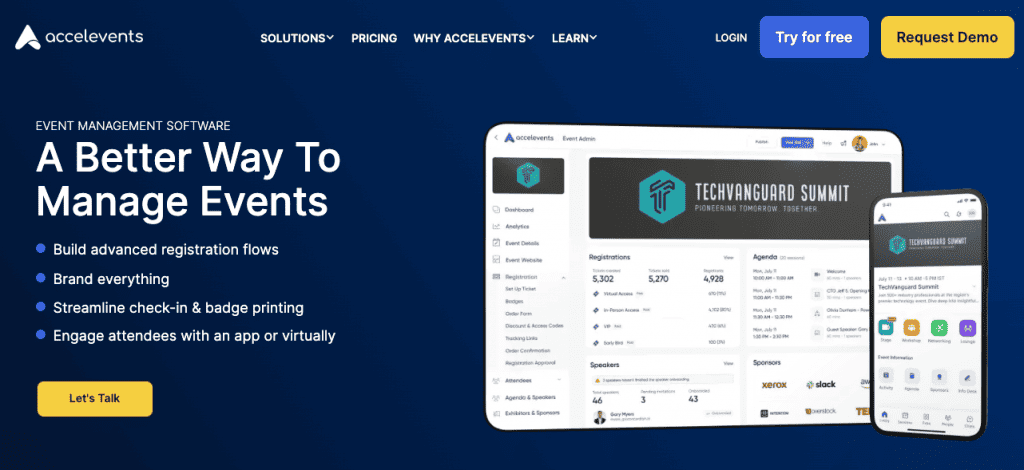
Strengths:
- Custom Registration Flows: Accelevents’ focus on custom flows with conditional logic and segmentation enhances the registration experience.
- Integration with CRMs: Seamless integration with CRMs and marketing automation tools facilitates real-time data utilization.
- Diverse Features: Features like assigned seating, pre-event session registration, and add-on sales contribute to a comprehensive event management experience.
Weaknesses:
- Pricing Information: Users might face challenges without clear pricing details, making it difficult to evaluate the platform’s affordability.
EventMobi:
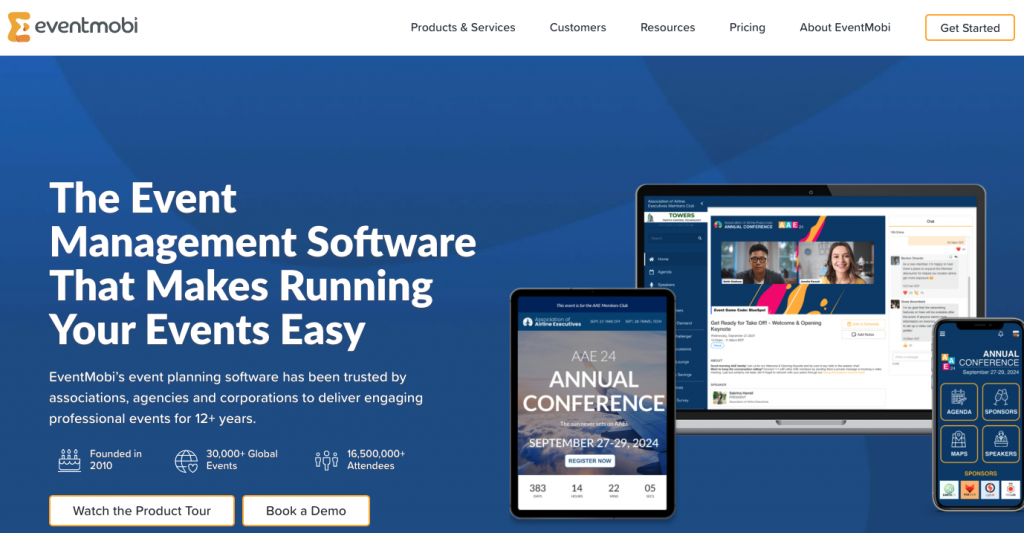
Strengths:
- Flexible Event Management: EventMobi positions itself as the most flexible event management software, catering to various event types.
- Longevity: With over 12 years in the industry and a substantial number of global events and attendees, EventMobi’s longevity is a strength.
- Versatile Solutions: Offering in-person, virtual, and hybrid solutions, EventMobi caters to a broad audience.
Weaknesses:
- Possibly Overcrowded Offerings: The inclusion of in-person, virtual, and hybrid solutions might lead to an overcrowded platform for users with specific needs.
- Limited Specific Features Mentioned: The content provided doesn’t delve into specific features, making it challenging to assess the depth of the platform.
Whova:
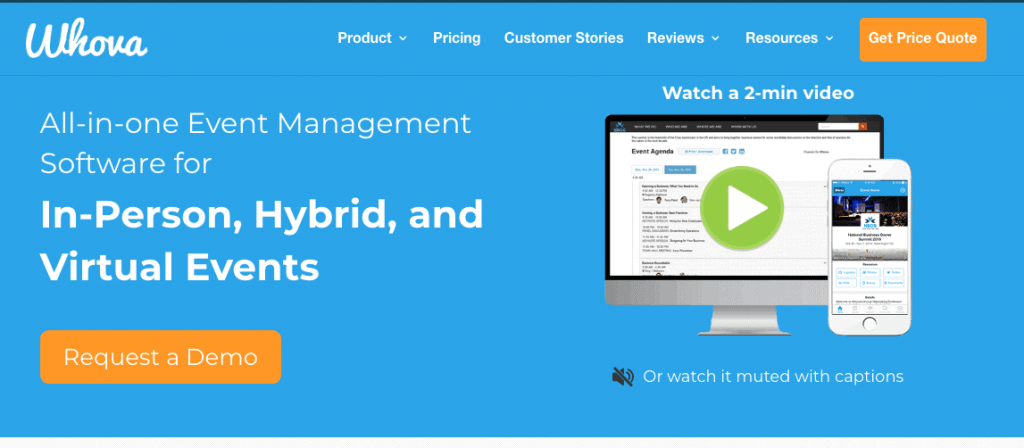
Strengths:
- Online Registration Customization: Whova’s customizable event registration forms and widgets contribute to a tailored registration process.
- Real-Time Reporting: The real-time reporting dashboard enhances the tracking of sales and attendance.
- Event Networking: The ability for attendees to connect and network via the mobile app adds a social element to events.
Weaknesses:
- Pricing Customization: Clear pricing information is not provided, potentially making it challenging for organizations to assess the platform’s cost-effectiveness.
General Observations and Recommendations:
- Pricing Transparency: The lack of clear pricing details across multiple platforms is a common concern for organizations. Transparency in pricing is crucial for informed decision-making.
- Feature Overload: While feature-rich platforms offer versatility, they may be overwhelming for smaller events. Event planners should assess their specific needs before opting for a platform. Sometimes less is better
- User Testimonials: Platforms with positive user testimonials instill trust and confidence.
- Flexibility and Freemium Plan: Oveit’s emphasis on flexibility and the availability of a freemium plan for up to 300 visitors is a unique strength, especially for growing events.
- Search for differentiators: While most platforms solve the same problems with the same basic solutions, searching for factors that differentiate platforms can help event planners discover new opportunities in their very competitive field.
In summary, the choice of an event registration platform should align with the specific needs, scale, and budget of the organization. Platforms offering pricing transparency, user testimonials, and a balance of features are likely to be well-received by a broad range of users.
